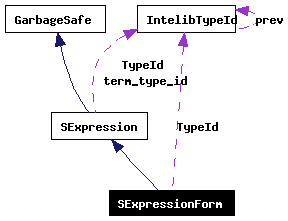
#include <lispform.hpp>
Inheritance diagram for SExpressionForm:


An object which represents a special form (or a special syntax). Most implementations do not represent such forms with any S-expressions; the InteLib implementation does. A form is created defining a child class of SExpressionForm in which the Call method must be defined. If text representations are enabled, then the TextRepresentation method is to be specified as well as it is left pure virtual by this class.
Definition at line 68 of file lispform.hpp.
Public Member Functions | |
| SExpressionForm () | |
| virtual void | Call (const SReference &formtail, IntelibContinuation &cont) const =0 |
| const IntelibTypeId & | TermType () const |
| Actual S-expression type. | |
| bool | IsChangeable () const |
| Can it be changed during the lifetime of the object? | |
| virtual SExpression * | Clone () const |
| Clone a changeable object. | |
| virtual class SString | TextRepresentation () const =0 |
| Text representation of the S-expression. | |
| virtual bool | SpecificEql (const SExpression *) const |
| Are the two objects EQL (while not EQ). | |
Static Public Attributes | |
| static IntelibTypeId | TypeId |
| Identifier for the set of all possible S-expressions. | |
Protected Member Functions | |
| SExpressionForm (const IntelibTypeId &id) | |
| virtual | ~SExpressionForm () |
| bool | CanDie () |
| Is it OK to delete the object now? | |
|
|
Definition at line 71 of file lispform.hpp. References TypeId. |
|
|
Definition at line 73 of file lispform.hpp. |
|
|
Definition at line 74 of file lispform.hpp. |
|
||||||||||||
|
Implemented in SExpressionIndirectAccessor, and LExpressionMacro. |
|
|
Actual S-expression type.
Definition at line 195 of file sexpress.hpp. Referenced by SReference::DynamicCastGetPtr(), SchReference::IsEql(), LReference::IsEql(), SReference::SimpleCastGetPtr(), SchReference::TextRepresentation(), and LReference::TextRepresentation(). |
|
|
Can it be changed during the lifetime of the object?
Definition at line 198 of file sexpress.hpp. References IntelibTypeId::IsChangeable(). |
|
|
Clone a changeable object. The method should return the pointer created with new
Reimplemented in SExpressionBacklink, SExpressionCons, SExpressionHashTable, SExpressionRawBuffer, and SExpressionVector. Definition at line 214 of file sexpress.hpp. |
|
|
Text representation of the S-expression. Returns the text string which represents the given S-expression as for real Lisp (for example, (25 36 49)) Implemented in SExpressionDoubleList, SExpressionInt, SExpressionFloat, SExpressionChar, SExpressionString, SExpressionClassicAtom, SExpressionLabel, SExpressionCons, SExpressionHashTable, SExpressionLocation, SExpressionRawBuffer, SExpressionVector, SExpressionWrapper< Data >, SExpressionIndirect, SExpressionIndirectAccessor, LExpressionContext, LExpressionLambda, LExpressionMacro, LExpressionUserCFunction, SchExpressionContext, and SchExpressionLambda. Referenced by SExpressionVector::TextRepresentation(), SchReference::TextRepresentation(), and LReference::TextRepresentation(). |
|
|
Are the two objects EQL (while not EQ). This function is overriden by those SExpressions able to be EQL while being not EQ.
Reimplemented in SExpressionInt, SExpressionFloat, SExpressionChar, and SExpressionString. Definition at line 235 of file sexpress.hpp. Referenced by SchReference::IsEql(), and LReference::IsEql(). |
|
|
Is it OK to delete the object now? Our children have no access to the private attribute RefCount and should never need it except when checking if the destruction is not an error. This solves the problem. Definition at line 53 of file refcount.hpp. |
|
|
Identifier for the set of all possible S-expressions.
Reimplemented from SExpression. Reimplemented in LExpressionMacro. Referenced by SExpressionForm(). |
 1.4.1
1.4.1